广州七年级英语下 U Reading 含语法点及习题
2019-2020广州七年级下册英语U1-U8语法归纳大全
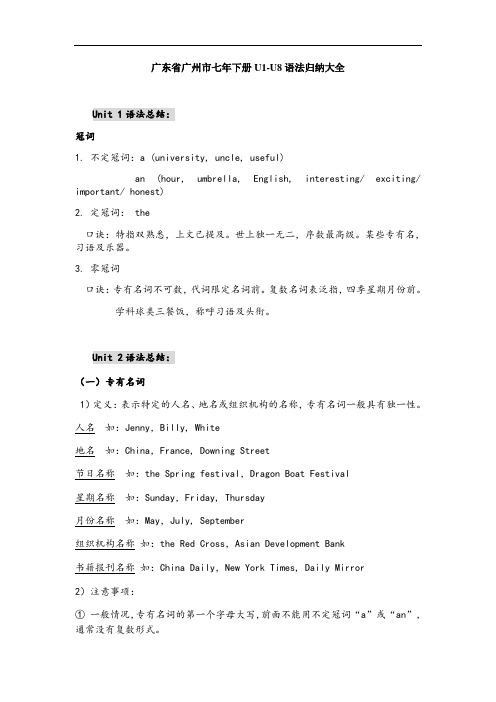
广东省广州市七年下册U1-U8语法归纳大全Unit 1语法总结:冠词1. 不定冠词:a (university, uncle, useful)an (hour, umbrella, English, interesting/ exciting/ important/ honest)2. 定冠词: the口诀:特指双熟悉,上文已提及。
世上独一无二,序数最高级。
某些专有名,习语及乐器。
3. 零冠词口诀:专有名词不可数,代词限定名词前。
复数名词表泛指,四季星期月份前。
学科球类三餐饭,称呼习语及头衔。
Unit 2语法总结:(一)专有名词1)定义:表示特定的人名、地名或组织机构的名称,专有名词一般具有独一性。
人名如:Jenny,Billy, White地名如:China,France, Downing Street节日名称如:the Spring festival,Dragon Boat Festival星期名称如:Sunday,Friday, Thursday月份名称如:May,July, September组织机构名称如:the Red Cross,Asian Development Bank书籍报刊名称如:China Daily,New York Times, Daily Mirror2)注意事项:① 一般情况,专有名词的第一个字母大写,前面不能用不定冠词“a”或“an”,通常没有复数形式。
Eg:Beijing is the capital of China.② 有时专有名词可以转化成普通名词,转化后它具有普通名词的特性,可以在其面前加不定冠词“a”也可以在词尾加表示复数形式的“s”。
Eg:A Mr Green called just now.③ 姓氏是专有名词,一般情况下,没复数形式,前面也不能加定冠词“the”。
但如果姓氏前面加定冠词“the”,并后面加上“s”时。
则表示“一家人”(其谓语用复数)。
(完整word版)广州上海牛津版英语七年级下-重点语法及练习
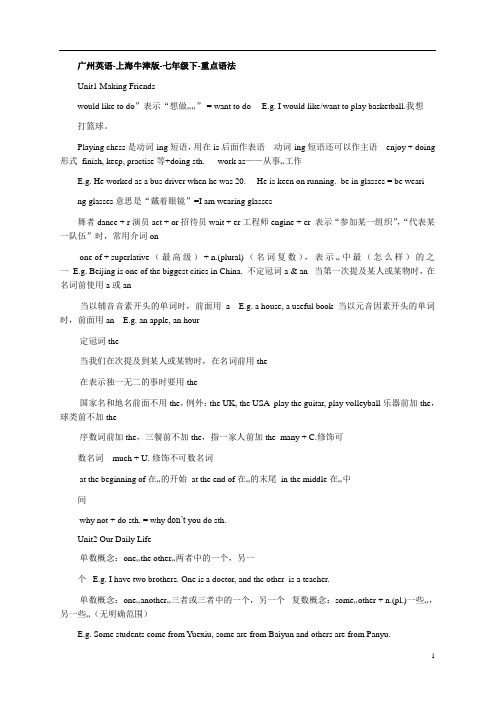
广州英语-上海牛津版-七年级下-重点语法Unit1 Making Friendswould like to do”表示“想做……” = want to do E.g. I would like/want to play basketball.我想打篮球。
Playing chess是动词-ing短语,用在is后面作表语动词-ing短语还可以作主语 enjoy + doing 形式 finish, keep, practise等+doing sth. work as——从事…工作E.g. He worked as a bus driver when he was 20. He is keen on running. be in glasses = be wearing glasses 意思是“戴着眼镜”=I am wearing glasses舞者dance + r 演员act + or 招待员wait + er 工程师engine + er 表示“参加某一组织”,“代表某一队伍”时,常用介词onone of + superlative(最高级)+ n.(plural)(名词复数),表示…中最(怎么样)的之一 E.g. Beijing is one of the biggest cities in China. 不定冠词a & an 当第一次提及某人或某物时,在名词前使用a或an当以辅音音素开头的单词时,前面用a E.g. a house, a useful book 当以元音因素开头的单词时,前面用an E.g. an apple, an hour定冠词the当我们在次提及到某人或某物时,在名词前用the在表示独一无二的事时要用the国家名和地名前面不用the,例外:the UK, the USA play the guitar, play volleyball 乐器前加the,球类前不加the序数词前加the,三餐前不加the,指一家人前加the many + C.修饰可数名词 much + U. 修饰不可数名词at the beginning of在…的开始 at the end of在…的末尾 in the middle在…中间why not + do sth. = why don’t you do sth.Unit2 Our Daily Life单数概念:one…the other…两者中的一个,另一个 E.g. I have two brothers. One is a doctor, and the other is a teacher.单数概念:one…another…三者或三者中的一个,另一个复数概念:some…other + n.(pl.)一些…,另一些…(无明确范围)E.g. Some students come from Yuexiu, some are from Baiyun and others are from Panyu.复数概念:some…the other + n.(pl.)一些…,另一些…(有明确范围)E.g. There are nine apples on the table. Some are red, the others are green. 一般现在时频率副词通常位于:be动词,助动词,情态动词的后面,行为动词的前面。
2019-2020广州七年级下册英语U1-U8语法归纳大全 (1)
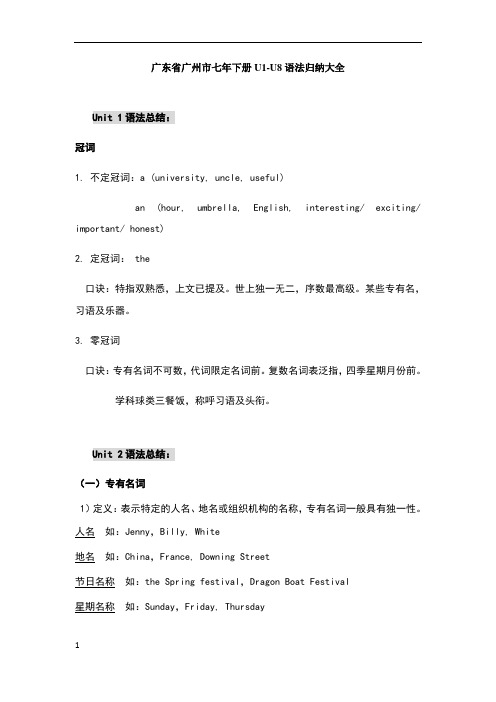
v1.0 可编辑可修改广东省广州市七年下册U1-U8语法归纳大全Unit 1语法总结:冠词1. 不定冠词:a (university, uncle, useful)an (hour, umbrella, English, interesting/ exciting/ important/ honest)2. 定冠词: the口诀:特指双熟悉,上文已提及。
世上独一无二,序数最高级。
某些专有名,习语及乐器。
3. 零冠词口诀:专有名词不可数,代词限定名词前。
复数名词表泛指,四季星期月份前。
学科球类三餐饭,称呼习语及头衔。
Unit 2语法总结:(一)专有名词1)定义:表示特定的人名、地名或组织机构的名称,专有名词一般具有独一性。
人名如:Jenny,Billy, White地名如:China,France, Downing Street节日名称如:the Spring festival,Dragon Boat Festival星期名称如:Sunday,Friday, Thursday月份名称如:May,July, September组织机构名称如:the Red Cross,Asian Development Bank书籍报刊名称如:China Daily,New York Times, Daily Mirror2)注意事项:① 一般情况,专有名词的第一个字母大写,前面不能用不定冠词“a”或“an”,通常没有复数形式。
Eg:Beijing is the capital of China.② 有时专有名词可以转化成普通名词,转化后它具有普通名词的特性,可以在其面前加不定冠词“a”也可以在词尾加表示复数形式的“s”。
Eg:A Mr Green called just now.③ 姓氏是专有名词,一般情况下,没复数形式,前面也不能加定冠词“the”。
但如果姓氏前面加定冠词“the”,并后面加上“s”时。
则表示“一家人”(其谓语用复数)。
(完整)广州版英语七年级U1-U3语法复习以及习题
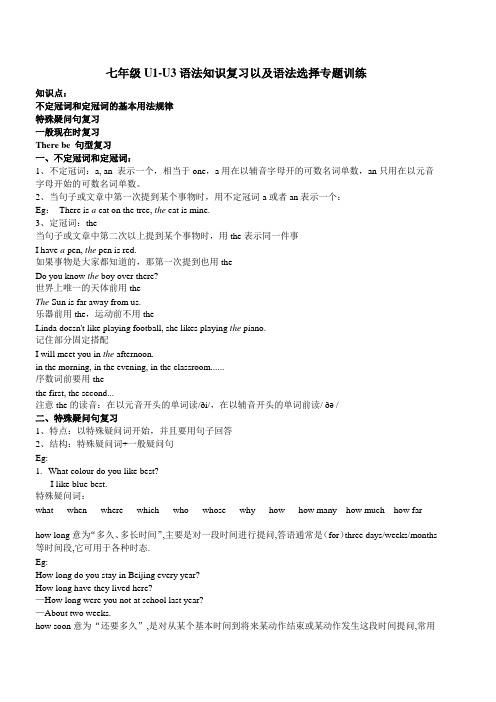
七年级U1-U3语法知识复习以及语法选择专题训练知识点:不定冠词和定冠词的基本用法规律特殊疑问句复习一般现在时复习There be 句型复习一、不定冠词和定冠词:1、不定冠词:a, an 表示一个,相当于one,a用在以辅音字母开的可数名词单数,an只用在以元音字母开始的可数名词单数。
2、当句子或文章中第一次提到某个事物时,用不定冠词a或者an表示一个:Eg:There is a cat on the tree, the cat is mine.3、定冠词:the当句子或文章中第二次以上提到某个事物时,用the表示同一件事I have a pen, the pen is red.如果事物是大家都知道的,那第一次提到也用theDo you know the boy over there?世界上唯一的天体前用theThe Sun is far away from us.乐器前用the,运动前不用theLinda doesn't like playing football, she likes playing the piano.记住部分固定搭配I will meet you in the afternoon.in the morning, in the evening, in the classroom......序数词前要用thethe first, the second...注意the的读音:在以元音开头的单词读/ði/,在以辅音开头的单词前读/ ðə /二、特殊疑问句复习1、特点:以特殊疑问词开始,并且要用句子回答2、结构:特殊疑问词+一般疑问句Eg:1.--What colour do you like best?--I like blue best.特殊疑问词:what when where which who whose why how how many how much how farhow long意为“多久、多长时间”,主要是对一段时间进行提问,答语通常是(for)three days/weeks/months 等时间段,它可用于各种时态.Eg:How long do you stay in Beijing every year?How long have they lived here?—How long were you not at school last year?—About two weeks.how soon意为“还要多久”,是对从某个基本时间到将来某动作结束或某动作发生这段时间提问,常用在一般将来时态的句子中,其答语通常是“in + 一段时间”.Eg:—How soon can you finish the work?—In half an hour.how often意为“多久……次、是否经常”,用来提问在某一特定的时间进行某个动作的次数,答语通常是always, usually, often, sometimes, once/twice a day/month等.Eg:—How often do you get to school very early?—Usually.3、把陈述句变为特殊疑问句。
广州英语七年级下册期末复习 U2 知识点 (附答案)
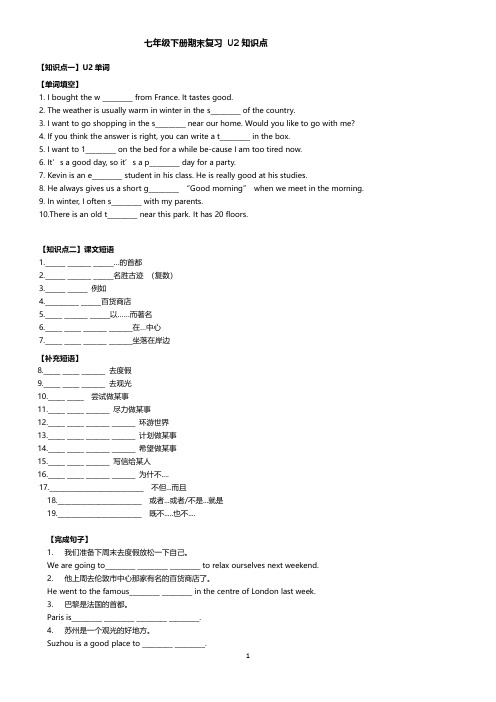
七年级下册期末复习 U2 知识点
【知识点一】U2 单词
【单词填空】 1. I bought the w _________ from France. It tastes good. 2. The weather is usually warm in winter in the s_________ of the country. 3. I want to go shopping in the s_________ near our home. Would you like to go with me? 4. If you think the answer is right, you can write a t_________ in the box. 5. I want to 1_________ on the bed for a while be-cause I am too tired now. 6. It’s a good day, so it’s a p_________ day for a party. 7. Kevin is an e_________ student in his class. He is really good at his studies. 8. He always gives us a short g_________ “Good morning” when we meet in the morning. 9. In winter, I often s_________ with my parents. 10.There is an old t_________ near this park. It has 20 floors.
广州版七年级U7-U8语法、语音、阅读、写作以及练习
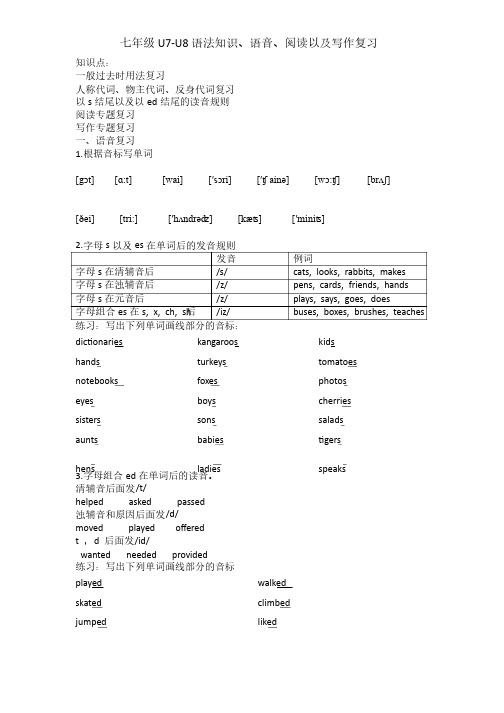
七年级U7-U8语法知识、语音、阅读以及写作复习语法知识、语音、阅读以及写作复习知识点:知识点:一般过去时用法复习一般过去时用法复习人称代词、物主代词、反身代词复习人称代词、物主代词、反身代词复习 以s 结尾以及以ed 结尾的读音规则结尾的读音规则 阅读专题复习阅读专题复习 写作专题复习写作专题复习 一、语音复习一、语音复习 1.根据音标写单词根据音标写单词[g [gɔɔt] [ɑ:t] [wai] [ʹsɔ[ʹsɔri] ri] [ʹʧ ainǝ] [w [wɔɔ:ʧ] [br [brʌʃʌʃʌʃ] ] [ð[ðei] ei] [tri:] [ʹhʌndrǝʣ[ʹhʌndrǝʣ] ] [kæ[kæʦ] ʦ] [ʹminiʦ[ʹminiʦ] ] 2.字母s 以及es 在单词后的发音规则在单词后的发音规则 发音发音例词例词字母s 在清辅音后在清辅音后/s/ cats, looks, rabbits, makes 字母s 在浊辅音后在浊辅音后/z/ pens, cards, friends, hands 字母s 在元音后在元音后/z/ plays, says, goes, does 字母组合es 在s, x, ch, sh 后/iz/ buses, boxes, brushes, teaches 练习:写出下列单词画线部分的音标:dic onaries hands notebooks eyes sisters aunts hens kangaroos turkeys foxes boys sons babies ladies kids tomatoes photos cherries salads gers speaks 3.字母组合ed 在单词后的读音。
在单词后的读音。
清辅音后面发/t/ helped asked passed 浊辅音和原因后面发/d/ moved played offered t ,d 后面发/id/ wanted needed provided 练习:写出下列单词画线部分的音标练习:写出下列单词画线部分的音标 played skated jumped walked climbed liked 二、一般过去时复习二、一般过去时复习一般过去时:在一般过去时:在 的时间发生的,特点是动词用了的时间发生的,特点是动词用了 式,规则的动词过去式是动词后加词过去式是动词后加 。
2020年广州七年级第二学期期末语法专题复习
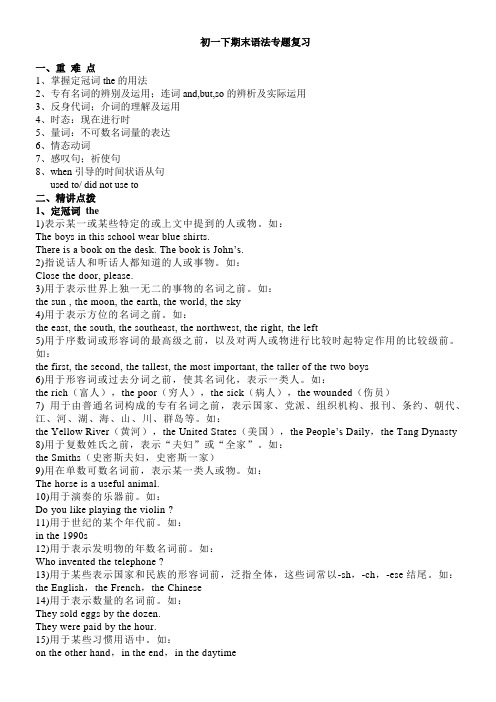
初一下期末语法专题复习一、重难点1、掌握定冠词the的用法2、专有名词的辨别及运用;连词and,but,so的辨析及实际运用3、反身代词;介词的理解及运用4、时态:现在进行时5、量词:不可数名词量的表达6、情态动词7、感叹句;祈使句8、when引导的时间状语从句used to/ did not use to二、精讲点拨1、定冠词the1)表示某一或某些特定的或上文中提到的人或物。
如:The boys in this school wear blue shirts.There is a book on the desk. The book is John’s.2)指说话人和听话人都知道的人或事物。
如:Close the door, please.3)用于表示世界上独一无二的事物的名词之前。
如:the sun , the moon, the earth, the world, the sky4)用于表示方位的名词之前。
如:the east, the south, the southeast, the northwest, the right, the left5)用于序数词或形容词的最高级之前,以及对两人或物进行比较时起特定作用的比较级前。
如:the first, the second, the tallest, the most important, the taller of the two boys6)用于形容词或过去分词之前,使其名词化,表示一类人。
如:the rich(富人),the poor(穷人),the sick(病人),the wounded(伤员)7) 用于由普通名词构成的专有名词之前,表示国家、党派、组织机构、报刊、条约、朝代、江、河、湖、海、山、川、群岛等。
如:the Yellow River(黄河),the United States(美国),the People’s Daily,the Tang Dynasty 8)用于复数姓氏之前,表示“夫妇”或“全家”。
七下英语U配套答案
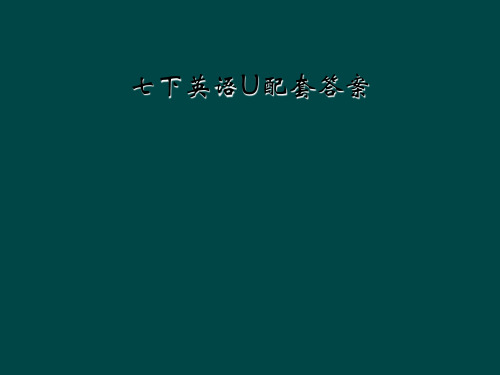
friends. We have different eating habits . Alice likes vegetable salad with tomatoes, salad and carrots . Because they are colorful . But she doesn’t like hamburgers , she thinks they are not healthy .Tom likes Chinese food , he thinks it’s delicious . He likes apples
. but happy day
Ⅸ I have a good friend , Jenny Green . She is a girl .She is 13 years old .Her birthday is on December 8th Hamburgers and apples are her favorite food ./Her favorite food is hamburgers and apples.
Ⅲ
1---5 ABACB 6---10 DACAB
Ⅳ 1 is doing 2 Do, have 3 is working
Ⅴ 1 are 2 many
3 them 4 are 5 Chinese 6 is driving 7 The other 8 speaks 9 listening to 10 to see
speak
Ⅳ 1warm and sunny
2 studying Russian;learning a lot
3 to visit some of my old friends
- 1、下载文档前请自行甄别文档内容的完整性,平台不提供额外的编辑、内容补充、找答案等附加服务。
- 2、"仅部分预览"的文档,不可在线预览部分如存在完整性等问题,可反馈申请退款(可完整预览的文档不适用该条件!)。
- 3、如文档侵犯您的权益,请联系客服反馈,我们会尽快为您处理(人工客服工作时间:9:00-18:30)。
Strategy
Power station is a compound noun. We may guess the meaning of a compound noun by looking at the two nouns. See more examples below:
bath + room = bathroom living + room = living room
2. Can you get me a packet of electricity, please? (lines 4-5) Benny.
3. She’ll look foolish. (lines 8) Daisy 4. It’s like water, in a way. (lines 11-12) Electricity 5. They are connected to a power station. (lines 16)
• harmful
B. silly
• When my computer is connected to the Internet, the Internet _A__ my computer and the other computers in the world together.
A. joins
电池内含有多种化学物质。它能把化学物质中 的能量转化成电能。当化学能耗尽后,电池也 就没有了电能,电池就不能用了。
READING
Before you read
Do you know how electricity comes to our
homes?
power
station
make
cable
electricity
D1
Find these sentences in the story on P73. Write the
name of the person or thing that pronoun in italics(斜 体) refers to.
1. I’ m going to buy some sweets. (lines 1-2) Daisy
wire
cable
D3 Discussion Who looks foolish in the end?
Find out the useful phrases and expressions.
1. 一盒…… 2.成盒装的 3.流经,流过 4.在某种程度上 5.与……相连接 6.片刻之后 7.看起来傻乎乎的
robot’s energy
come from?
READING
A. What do you know...?
There are three ways of producing electricity. Write the correct words in the blanks.
solar power
bring 拿来
选词填空: get / take / bring ① Please b__r_in__g_ your homework here. We
will check the answers together. ② Can you _g__e_t_ me a cup of coffee? ③ This is your brother’s letter. T_a_k__e__it to
Battery
A battery contains a store of chemicals. It turns energy from the chemicals into electrical energy. When the chemical energy is used up, the battery runs out of electrical energy. It stops working.
Reading
Energy, electricity and batteries
Energy Energy is the ability to do some kind of work. That can make things move, heat things up, or make light or sound. 能量是做功的能力,它可 以使物体运动、升温或者发出光和声音。
light bulb
wire
I’m a robot. My
Let’s discuss!
I’m a boy. My energy comes
energy comes from electricity.
from food.
1.◆WwohCradta“deonneesyrgthoye”u tell me what the
➢The light, TVs and computers in our homes are (3)_c_o_n_n_e_c_t_e_d_t_o_______ the power station through (4) __w__ir_e_s_______.
➢Electricity is very important to us. We need it at home, at work and in school. Could (5)_a_n_y_o_n_e____ live in a world without electricity?
Language Points
She’ll look foolish. 她看上去会很傻。 解析:look 在此意为“看起来好像;显得”,后
接形容词。如:
• Your daughter looks very beautiful. 你女儿看起来挺漂亮的。
• 与look 用法相同的连系动词还有: sound“听起来”,smell “闻起来”,taste“尝起 来”和feel “摸起来;感觉”。
tompeiacn?will be about of this unit?
2.Where does the
boy’s ene-r-gy-electricity
come from?
power and ability to do a lot of
3.Where does the
work or activities
2.What do you think the story may be a about? ab.Where electricity comes from. bc.What electricity is like. c.What we use electricity for.
d.How we can use electricity safely.
him.
Language Points
a packet of 一盒…… + c.n (pl.) / u.n
e.g. a packet of eggs
a packet of milk
in packets 盒装的 in + c.n/u.n
e.g. in peace 和平 in tens 以十为计, 十进制 in pieces 破碎地 in surprise 惊奇地
A. electricity
B. heat
C2. Complete the passage below with words and phrases from the box. anyone connected to in a way power station wires
➢Electricity is like water,(1) __i_n_a__w_a_y______ . It flows from the (2)_p_o_w_e_r_s_t_a_ti_onto our homes.
B. carries
4. If you ask someone to wait for a moment, you will come back in _B___.
A. a long time
B. a short time
5. Batteries provide toy cars with __A___.
=Can you get _t_h_e__b_o_o_k_f_o_r_m__e____?
e.g. Can I get you a drink? =___C_a_n_I_g_e_t_a__d_r_in_k__fo_r__yo__u_?____?
Language Points get 去取来 take 拿走
•a packet of… •in packets •flow through •in a way •be connected to… • a moment later •look foolish
Language Points
sweet adj. n. 糖果 c.n → sweets
甜品 u.n e.g. 这些糖果给你。 There are some sweets for you. e.g. 冰淇淋是我最喜欢的甜品。 Ice cream is my favourite sweet.
water power
wind power
wind power
water power
solar power
B. Before you read
• Look at the photos and the title, and answer these questions.
1. What did the girl buy? Some batteries
Cables
D2 How does electricity get to Benny’s flat? Choose
the correct words in the box to label the diagram(图解
